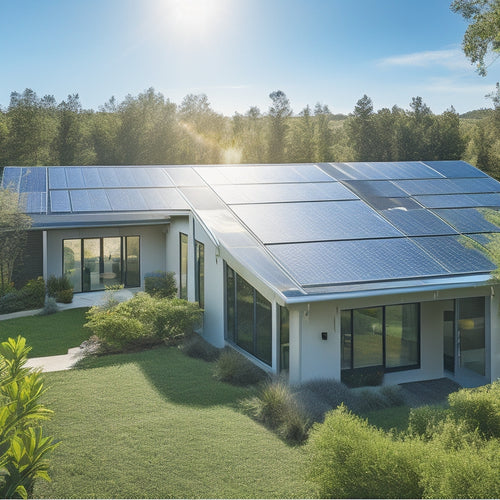
Power Your Home With Portable Green Options
Share
You're taking control of your energy independence by utilizing solar energy potential to power your home. Portable solar panels and energy storage systems enable off-grid clean energy generation, and high-efficiency solar charging solutions maximize energy collection. By choosing the right solar panels, calculating your energy needs, and selecting the best battery options, you can create a customized system. To guarantee peak performance, regular maintenance, including panel cleaning and battery inspections, is vital. As you investigate these essential components, you'll uncover how to balance energy storage capacity, charging speed, and installation costs to access a reliable, eco-friendly power solution for your home, and that's just the starting point.
Overview
- Portable solar panels and energy storage systems enable off-grid clean energy generation, reducing reliance on fossil fuels and lowering energy bills.
- High-efficiency solar charging solutions with built-in monitoring systems maximize energy collection and provide real-time energy insights.
- Solar-powered appliances reduce vulnerability to utility companies, minimize waste in energy conversion, and offer lower operating costs and a reduced carbon footprint.
- Calculating daily energy needs by considering appliance wattage, usage, and energy-intensive activities helps determine the required energy storage capacity and power rating.
- Regular maintenance, including panel cleaning and battery inspections, is essential for optimal performance, extending the lifespan and efficiency of solar setups.
Harnessing Solar Energy Potential
As the world shifts towards a more sustainable future, you're likely considering ways to reduce your carbon footprint, and utilizing solar energy potential is an excellent place to start.
By leveraging the power of the sun, you can greatly decrease your reliance on fossil fuels and lower your energy bills. Solar energy innovations have made it possible to integrate residential solar solutions into your daily life seamlessly.
With portable solar panels and energy storage systems, you can generate clean energy on-the-go, freeing you from the grid. Advanced systems with high-efficiency solar charging solutions enable maximum energy collection, and built-in monitoring and control provide real-time energy perspectives.
This means you can power your home, RV, or even your outdoor excursions with renewable energy. By embracing solar energy, you're not only reducing your carbon footprint but also gaining independence from traditional energy sources.
Choosing the Right Solar Panels
Your solar energy expedition begins with selecting the right solar panels for your needs.
You'll want to take into account panel efficiency, which measures how well a panel converts sunlight into electricity. Look for high-efficiency panels (above 20%) to maximize your energy output. For instance, high-efficiency silicon solar cells can achieve conversion rates over 26% efficient panels, making them suitable for off-grid systems.
Additionally, durable thin-film photovoltaics offer flexibility and reduced material consumption, ideal for remote energy solutions. When choosing a panel, also take into account its wattage, durability, and warranty.
Additionally, think about the installation process. Verify your roof receives sufficient sunlight and is structurally sound to support the panels. Follow installation tips, such as angling the panels at 30-40 degrees, to optimize energy production.
Solar Powered Appliances Benefits
A sleek, solar-powered refrigerator hums quietly in the corner of your off-grid cabin, keeping your food and drinks chilled to perfection.
This eco-friendly alternative to traditional appliances offers you the freedom to live life on your own terms. By embracing independence through solar power systems, you can reduce your vulnerability to utility companies energy independence and enjoy the benefits of clean energy.
Solar powered appliances boast impressive efficiency, converting sunlight into usable energy with minimal waste. You'll appreciate the reduced carbon footprint and lower operating costs.
With solar appliance efficiency, you can enjoy the comforts of home while minimizing your impact on the environment. Plus, these eco-friendly alternatives require minimal maintenance, giving you more time to focus on what matters most.
Calculating Your Energy Needs
How much energy do you really need to power your off-grid lifestyle? Calculating your energy needs is essential to guarantee you have a reliable and efficient power system.
Start by making a list of all the appliances and devices you'll be using, including their wattage and average daily usage. Add up their total energy consumption to determine your daily energy needs.
Conduct an energy audit to assess your historical consumption and consider future energy changes from new appliances or family members.
Consider power efficiency by choosing appliances with low wattage and high energy ratings. You'll also want to account for any energy-intensive activities, like cooking or refrigeration.
Selecting the Best Battery Options
As you shop for portable green options, you'll need to decide on the best battery type for your needs, whether it's lead-acid, lithium-ion, or nickel-cadmium.
The energy storage capacity you require will also depend on your power usage and the duration you need the battery to last.
Additionally, consider the charging speed, as it can greatly impact how quickly you can replenish your power supply.
Battery Type Comparison
Freedom from the grid begins with a reliable power source, and the right battery is crucial to accessing it.
When choosing a battery, you'll likely consider lithium and lead acid options. Lithium batteries offer advantages like a longer lifecycle, higher capacity ratings, and faster discharge rates. They're also more eco-friendly and compact. However, they come at a higher cost.
Lead acid batteries, on the other hand, have drawbacks like shorter lifecycles, lower capacity ratings, and slower discharge rates. But they're more affordable.
Consider your power needs and budget when deciding between these options. Make certain to check voltage compatibility to guarantee seamless integration with your system.
With the right battery, you'll be one step closer to achieving energy independence.
Energy Storage Capacity
You've narrowed down your battery type to either lithium or lead acid, but now it's time to think about energy storage capacity. This vital aspect determines how much power your portable green setup can provide.
When selecting the best battery option, consider your energy needs and the renewable sources you'll be using to recharge. Look for batteries with high energy efficiency to minimize waste and maximize your energy independence.
Calculate your daily energy requirements and choose a battery with a capacity that can meet or exceed that demand. A higher capacity may provide a safety net, but it also increases the upfront cost.
Strike a balance between energy storage capacity and affordability to achieve the freedom you desire.
Charging Speed Matters
Three key factors influence the charging speed of your portable green battery: the type of renewable energy source, the capacity of the battery, and the charger's power rating. You want a battery that can capture energy efficiently and quickly. When choosing a battery, consider the charging speed you need. If you're relying on solar technology, you'll want a battery with high charging efficiency to maximize energy absorption.
| Charging Speed | Capacity | Power Rating |
|---|---|---|
| Fast (3-5 hours) | 1000Wh | 300W |
| Medium (5-8 hours) | 500Wh | 150W |
| Slow (8-12 hours) | 200Wh | 50W |
| Ultra-Fast (1-2 hours) | 2000Wh | 600W |
Installing Solar Power Systems
How much energy can you realistically capture from the sun, and what're the essential components of a solar power system that will help you achieve this goal?
When installing solar power systems, you'll need to take into account factors like panel efficiency, inverter type, and mounting options. A well-designed system will maximize your energy output, giving you a significant step towards grid independence.
While installation costs may seem steep, they're a worthwhile investment in your freedom from reliance on traditional energy sources. By choosing the right components and optimizing your system's performance, you can utilize enough solar energy to power your home, reducing your reliance on the grid and your energy bills.
Maintaining Your Solar Setup
You'll want to establish a routine to guarantee your solar setup operates at peak efficiency.
Start by creating a panel cleaning schedule to remove dirt and debris that can reduce energy output.
Additionally, perform regular battery maintenance checks to identify and address any potential issues before they become major problems.
Panel Cleaning Schedule
A well-maintained solar setup relies heavily on a regular panel cleaning schedule to guarantee peak energy production.
You should clean your solar panels every 6-12 months, depending on your location and climate. Dust, dirt, and debris can reduce panel efficiency by up to 25%, so regular cleaning is vital.
Consider seasonal factors when creating your cleaning schedule. For example, if you live in an area with high pollen counts in the spring, you may need to clean your panels more frequently during this time.
A clean solar panel guarantees maximum energy output, giving you the freedom to power your home reliably and efficiently.
Battery Maintenance Checks
Reliability hinges on the regular inspection of your solar setup's battery maintenance, ensuring the stored energy is always available when needed. You must stay on top of your battery's condition to maximize its lifespan and performance. By doing so, you'll enjoy a longer battery lifespan extension and a more reliable power supply.
| Task | Frequency |
|---|---|
| Check battery voltage monitoring | Monthly |
| Inspect for signs of corrosion | Quarterly |
| Perform an equalization charge | Semi-annually |
| Run a capacity test | Annually |
Frequently Asked Questions
Can I Use Solar Power During a Grid Outage?
You can definitely use solar power during a grid outage, leveraging solar energy advantages for grid independence, as long as you've invested in a battery backup system or an inverter that allows off-grid operation, ensuring your freedom from reliance on the grid.
Are Portable Solar Generators Noisy?
You're wondering if portable solar generators are noisy; the answer is, they're relatively quiet, with an average noise level of 60 decibels, similar to a normal conversation, thanks to their high-efficiency inverter technology that minimizes solar generator noise.
Do Solar Panels Work on Cloudy Days?
You'll be happy to know that solar panels still work on cloudy days, albeit with reduced solar efficiency. While cloudy weather absorbs some sunlight, panels can generate up to 25% of their maximum output, ensuring you still capture some green energy.
Can I Take My Solar Setup With Me When I Move?
As you're packing up to leave, you wonder: can you take your solar setup with you? Absolutely! You've invested in portability, and moving solar systems is a breeze, allowing you to capture the sun's energy wherever life takes you.
Will Solar Power Increase My Property Value?
When you install solar power, you'll likely increase your property value, which may also raise your property tax; however, the benefits of energy independence and long-term savings will far outweigh the costs, giving you the freedom you desire.
Ready to Buy
As you flip the switch to a greener tomorrow, remember that every watt counts. With solar power, you're not just illuminating your home, but also brightening the planet's future. So, take the leap and let the sun shine in - your wallet and the environment will thank you.
Related Posts
-

Top Eco-Friendly Camping Equipment for a Sustainable Adventure
When you're camping with the planet in mind, opt for eco-friendly gear like tents made from recycled materials and bi...
-

Why Outdoor Solar Lighting Systems Are Sustainable
Outdoor solar lighting systems are sustainable because they utilize renewable energy, drastically reducing your carbo...
-

Installing Metal Solar Roofs for Maximum Energy Efficiency
Installing metal solar roofs can drastically enhance your home's energy efficiency and durability. These roofs withst...


